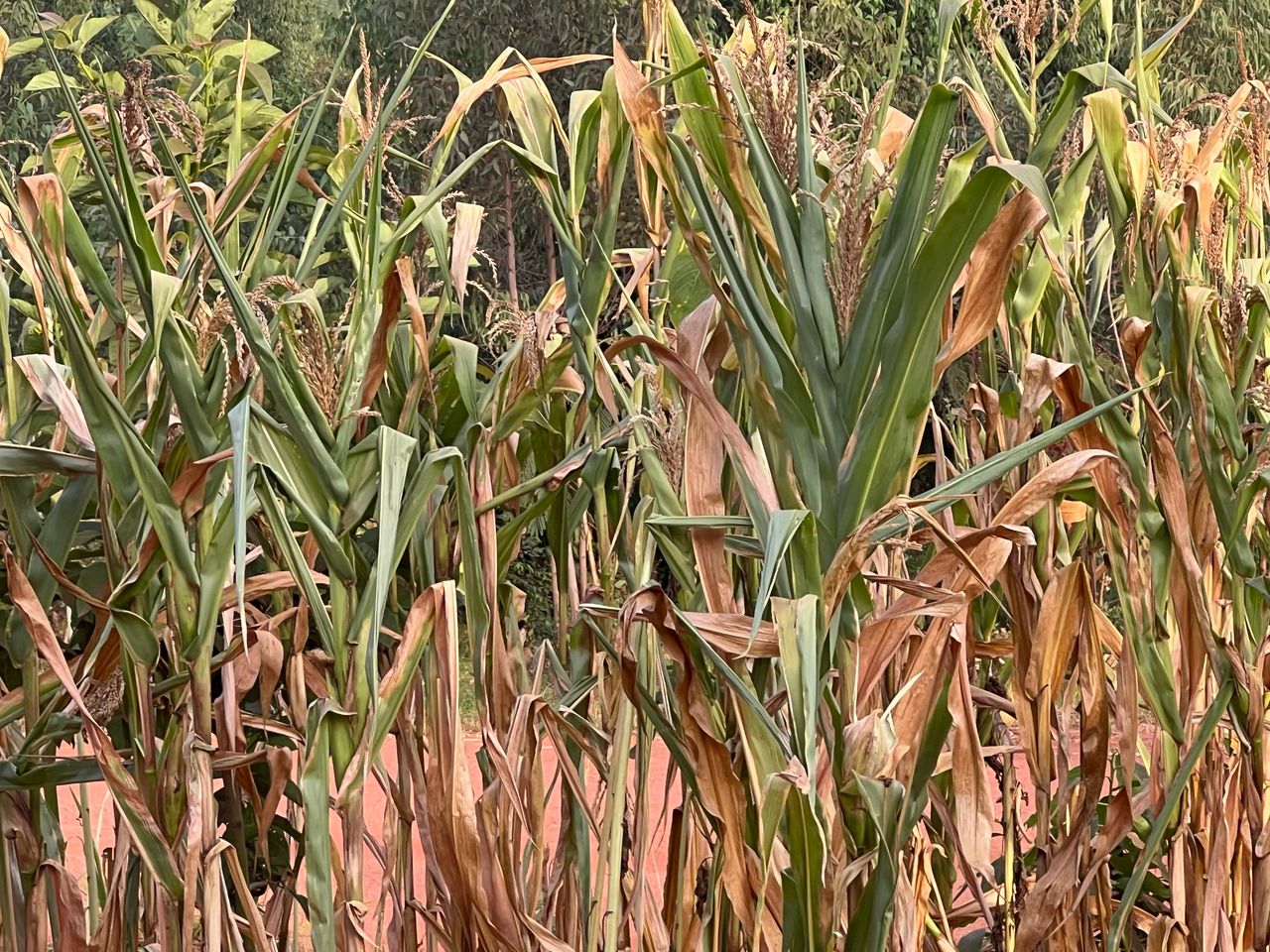
Climate change in Rwanda is increasingly threatening livelihoods and agriculture, by posing severe challenges to food security and economic stability. Rising temperatures, erratic rainfall and prolonged droughts in some regions have disrupted farming cycles, reduced crop yields, and increased soil degradation. Smallholder farmers, who make up the majority of Rwanda’s agricultural workforce, are especially vulnerable, facing declining productivity and income losses. As the country strives to build resilience, initiatives such as climate-smart agriculture, improved irrigation systems, and sustainable land management are becoming crucial in mitigating these effects. Addressing climate change is not just an environmental issue but a socio-economic necessity for Rwanda’s sustainable development.
As the Cornerstone of Rwanda’s economy, Nowadays, agriculture provides livelihoods for over 70% of the population and contributes to about 33% of the country’s Gross Domestic Products (GDP). While this sector is considered as the main pillar of country’s economy but around 90% of Rwandan territory lies on slopes which are affected by climate change day per day, experiencing soil erosion, soil reduction of fertility, increased temperatures, reduced or delayed rainfall, floods, and droughts compose the threat to Rwandan Agriculture.
Urumuri.com visited most affected regions (Eastern, South and western provinces) of Rwanda and farmers shared their concerns about the effects of climate change on their profession, they mentioned the main challenge of facing prolonged dry season. As a result, their yields have decreased significantly and their living conditions are gradually decreasing.
Farmers’ Struggles Amid Climate Change
Mwubahamana Mwadjuma from Bugesera District, Musenyi Sector, told UbumweNews that climate change poses a significant threat to her farming. She says: “In the past month, we have harvested nothing not even maize or beans. I am currently cultivating, but I don’t know if it will rain or not. A few months ago, our yields were low due to insufficient rainfall. Honestly, the last time we had a good harvest was in 2017. I used to grow cassava successfully, producing up to 1,000 kg, but now I barely get 300 kg.”
Mwadjuma adds that climate change has led to food shortages, even as many people continue to invest heavily in agriculture. She explains: “Some farmers have lost hope and say they will never cultivate again because of the losses caused by climate change. Just look over there the strong winds blew down the banana trees, and they all fell down.”
Umuhoza Devotha, an 18-year-old who turned to farming as a means of self-employment in Musenyi Sector, Gicaca Cell, Remera Village, says that agriculture is not doing well. She states: “There has been excessive sunlight, leading to poor crop yields. The only crop that has managed to survive is cassava, but even that has had a low yield, with a basket now costing 3,000 RWF. The effects of climate change here include high investment without returns. The last good harvest we had was last year, but this year we only got 50% of what we harvested the previous year.”
Kamanayo Emmanuel, a farmer specializing in rice and beans in Ruhashya Sector, Karama Cell, Kampongo Village in Huye District, works in the Rwashyara marshland in Muginaga. He also says that climate change has significantly affected them: “When rainfall is low, the harvest is poor. Farming on the hills has become a big problem. For instance, the beans we planted on the hills dried up because the rain no longer come on time.”
Nahimana Marie Alice, from Ruhashya Sector, Muhororo Cell, Nyakabingo Village in Huye District, also says that agriculture is now greatly affected by climate change: “There is no rain, and our beans have dried up. Farming on the hills has completely failed. Due to climate change, we harvest nothing. If I used to get a 100-kilogram sack of beans, now I can’t even get five kilograms. This is a serious problem, and the consequence we are facing now is hunger.”
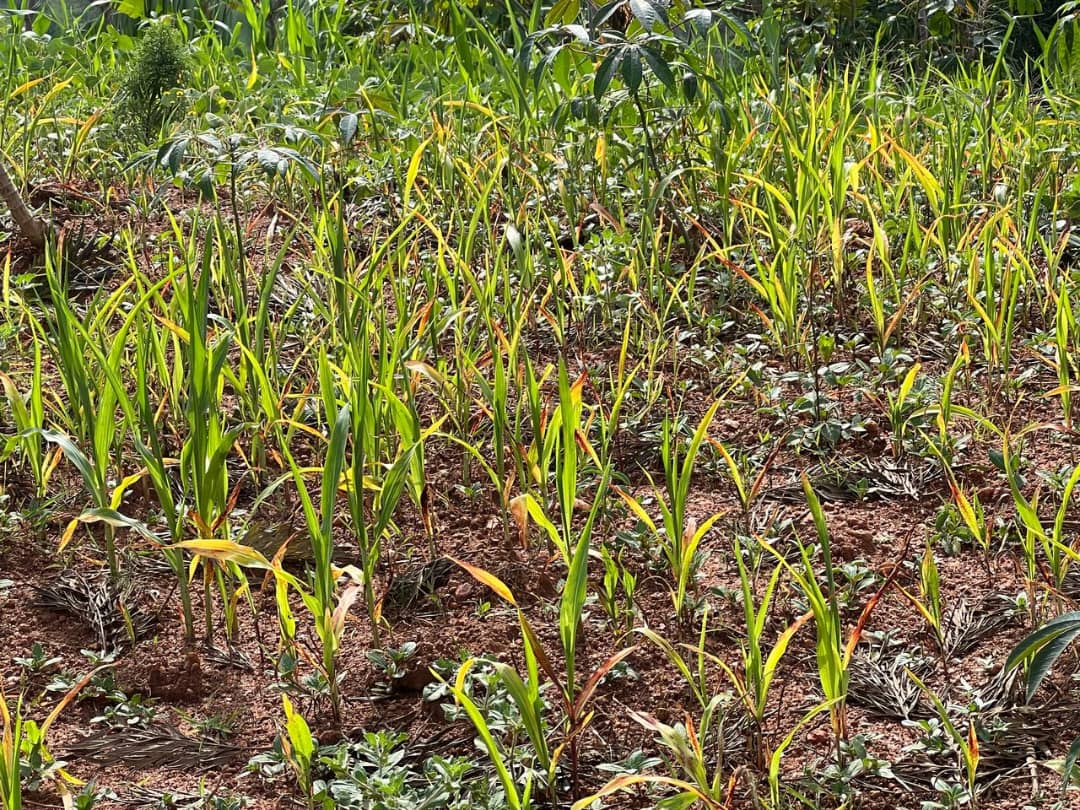
Another farmer, Uwineza Zahara from Bugesera, a district frequently affected by climate variability in Rwanda, says that climate change has caused farmers to lose hope in agriculture. She says: “Farmers here face a problem of extreme drought. In the last season, we planted beans and maize, but they all dried up. We tried using fertilizers, but they were ineffective due to the intense sunlight. Personally, I got a good harvest in two years ago. Now, we are severely affected by drought. Someone who used to harvest 100 kilograms now only gets 20 kilograms.”
She adds that due to climate change, farmers experience significant losses, leading to poverty and poor living conditions. “We face hunger. Now, we farm but also look for other jobs because we can no longer rely on agriculture due to climate change,” she says.
Tuyisenge Djamila, who has been farming for a while to make a living, says that she lost hope due to poor yields caused by the climate change. She mentions: “Here in Remera, the main issue affecting farmers is the sunlight. We practice mixed farming, growing beans, maize, and cassava. However, crops failed because of inadequate rainfall.”
She adds that many have abandoned farming and are now investing in other activities. “We save money in groups and look for alternative businesses. We take on casual labor jobs to survive. Now, we just try to grow vegetables like cabbage in marshlands,” she says.
She continues, stating that the intense sunny season is a major challenge for farmers, pushing many to stay into poverty due to poor harvests. She concludes: “We are starving, and we lack financial resources, which even affects our children at school as they face expulsion due to unpaid fees. We urge agricultural authorities to provide us with irrigation equipment to combat climate change.”
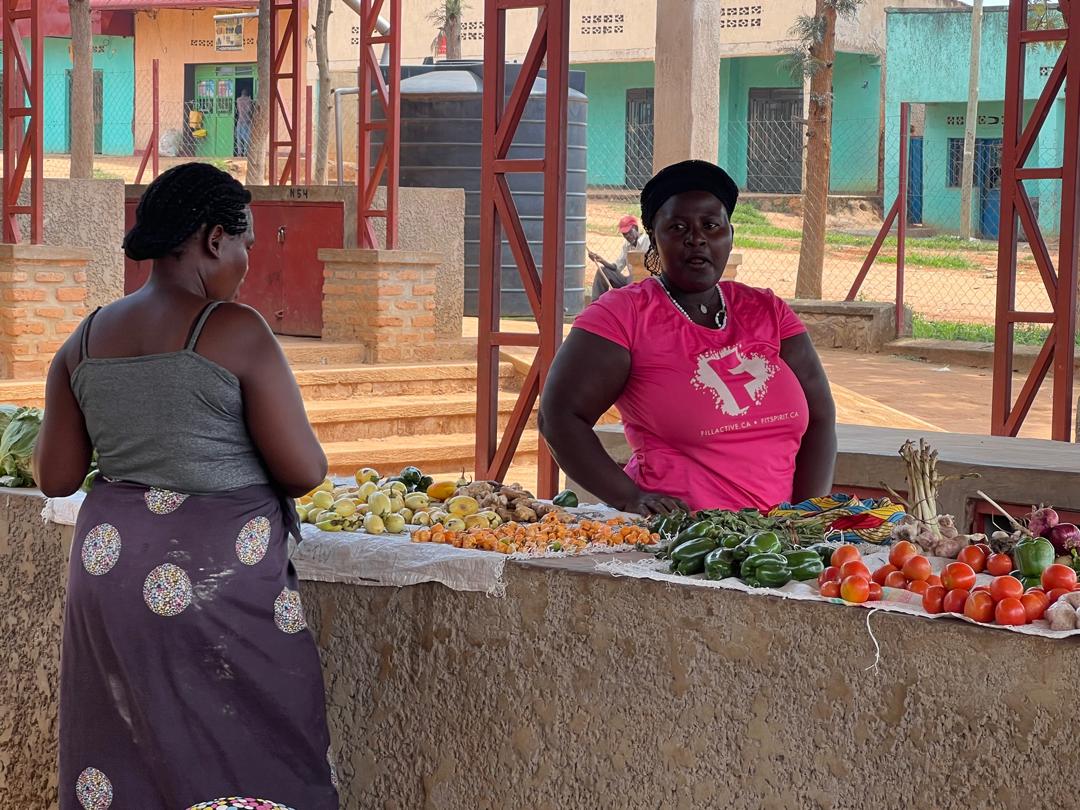
Ntezirembo Jean Claude, a 45-year-old farmer from Bugesera, Mayange, whom we found planting beans, says that many farmers have given up due to the losses caused by climate change. He states: “In the last season, we harvested nothing. We are suffering due to the lack of maize and beans. Look at this failed maize, it is small because of sun season. Those who planted groundnuts did not harvest anything at all. If someone harvested five plates, others did not even get one. Farming is now unpredictable. Each season, what we harvest depends on how much rain falls. Many people are now planting forests instead of crops because of the drought. The rain, when it come, also cause destruction.”
Regarding the challenges caused by climate change, he says: “Hunger is constant here due to drought and soil erosion that affects farmlands. If you don’t have organic manure or chemical fertilizers, you harvest nothing.”
Uwimana Claudine, from Gihundwe Sector, Shagasha Cell, Nyagatare Village in Rusizi District, also says that agriculture is no longer productive due to climate change. In an interview with UbumweNews.com, after weeding her cassava plantation, she said: “We mainly grow beans and cassava. When it rains, we plant vegetables. However, in the last farming season, we harvested nothing, and even now, the situation is bad. We are now forced to plant early because of unpredictable weather. Sometimes, planting early leads to a good harvest, but other times, it results in total failure. The main challenge now is extreme heat, and heavy rains that can also wash away crops due to soil erosion.”
She emphasizes that agricultural production has drastically decreased because of climate change. “The issue is unpredictable weather patterns. What I may request is that they would help us to have irrigation machines. We can no longer rely on rain-fed farming.”
Nzamurambaho John, a resident of Kirehe Village, Shyanda Cell, Save Sector in Gisagara District, says that climate change has caused poverty in his area. He explains: “Agriculture is no longer productive. The main challenge we face is drought. When it’s not drought, heavy rains come and wash away crops, causing losses. Here, we mostly grow beans and cassava, but the harvest has become very low. In good weather, I could harvest about two sacks of beans, but in bad seasons, I only get one sack.”
He adds that coping with climate change remains a challenge: “When drought hits, we move to marshlands to plant vegetables. We are always struggling with poverty due to drought and natural disasters. Sometimes, heavy rains erode entire hills, destroying crops and leaving us with nothing. Now, we no longer trust the weather. The only thing we can do is plant early.”
Niyitegeka Deo, a maize farmer from Muhororo Cell in Huye District, cultivates in the Rusuri rwa Muginga marshland. He says: “Last season was the only one where I managed to get good harvest. But now, I have harvested nothing. Due to climate change, farming on the hills is no longer viable. In the last season, we planted crops like sorghum and beans, but they all died due to excessive heat.”
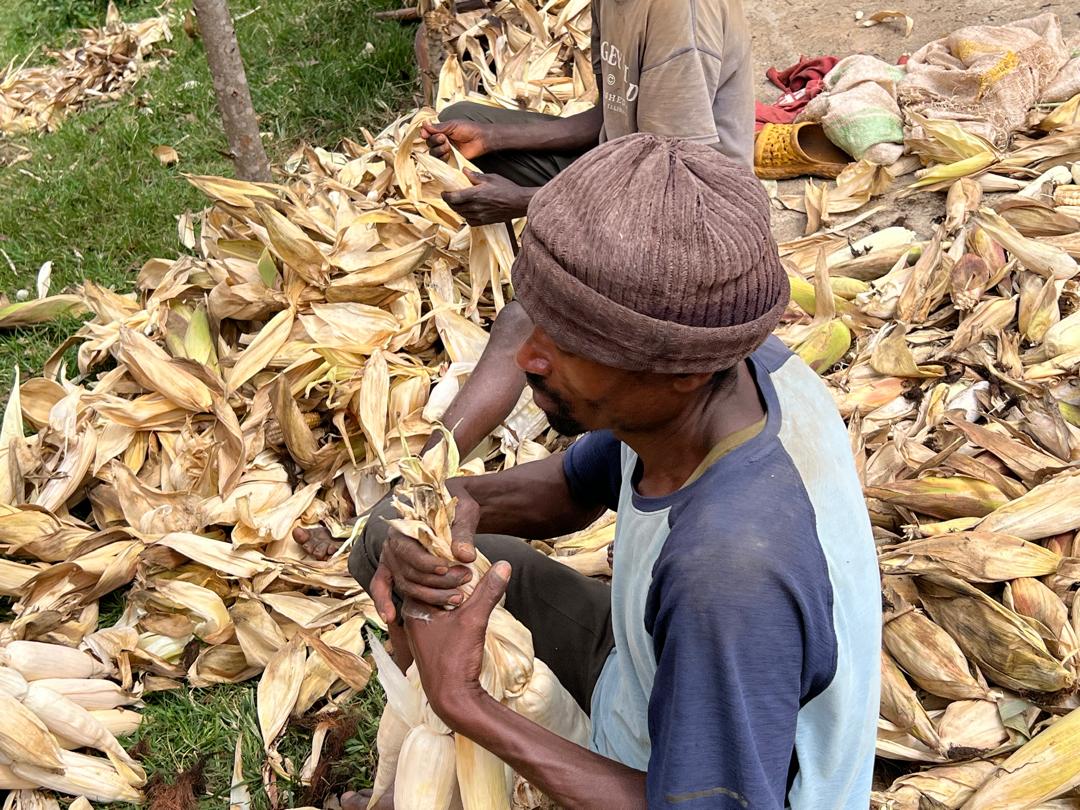
Musabese Clementine, a 40-year-old farmer, states that farming is no longer a reliable occupation due to climate change. She explains: “Farming here is suffering because the soil has lost its fertility. Rainfall is also unpredictable. When we need rain, it doesn’t come, and when we finish planting, it rains and washes everything away. If you don’t have a banana plantation to rely on when experiencing agricultural losses, you will struggle financially. The well-being of farmers here depends on rain. Right now, it has rained for three consecutive days, but when we needed it most for early planting, it was absent. And when it does come, it’s very little and disappears quickly.”
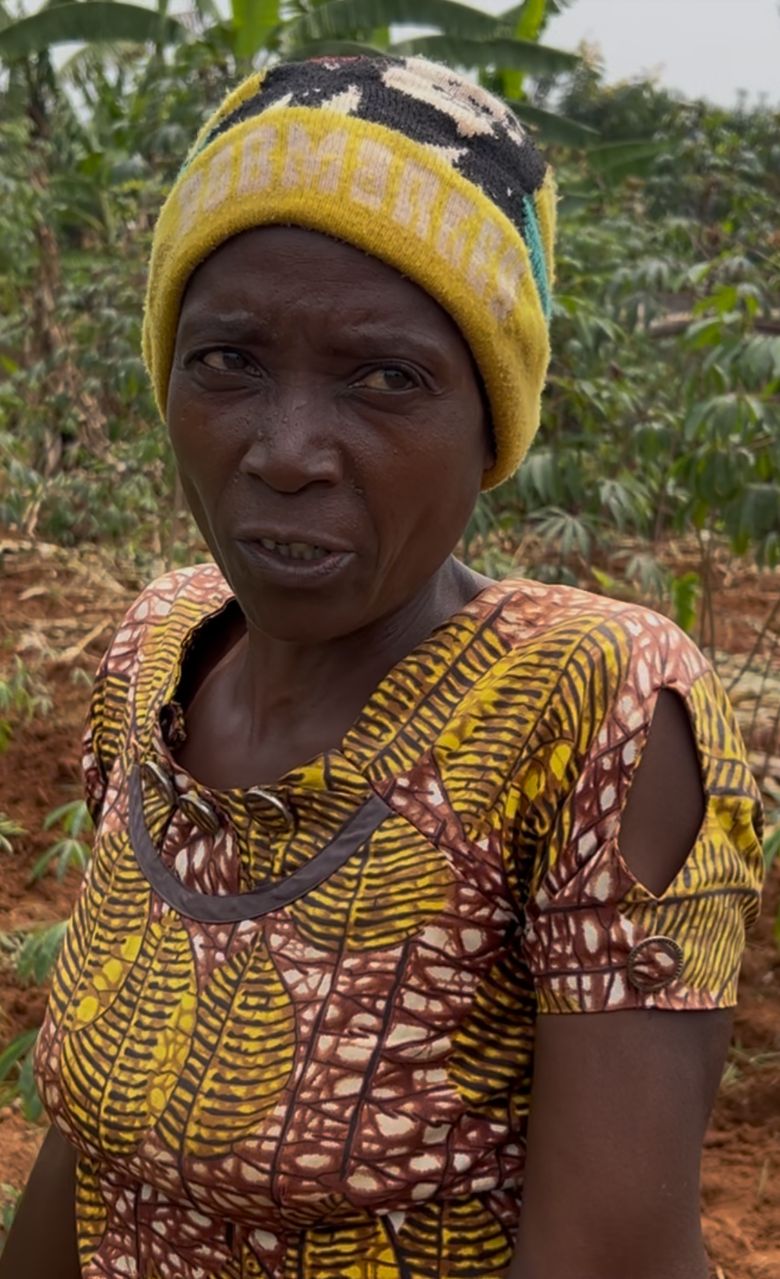
Rwamanywa Janvier, a farmer from Musenyi Sector, Gicaca Cell, Remera Village, says farming is struggling due to heat and irregular rainfall. “Here, we mostly grow maize, beans, sweet potatoes, and cassava. If I plant groundnuts well, I can harvest 150 kilograms, but now I won’t get anything, not even three kilograms. The main reason is the excessive sunny season. The sun has scorched everything we planted. We hoped to plant again this season, but we are facing losses again. The entire year of 2024 has been a failure in farming,” he added.
He confirms that the main issue is climate change: “Previously, even poor farmers had at least two sacks of beans, three sacks of unprocessed groundnuts, and some maize stored. But now, nothing. Even in marshlands, farming is not doing well because of water shortages. The banana plantations that once thrived are now being destroyed by strong winds caused by climate change.”
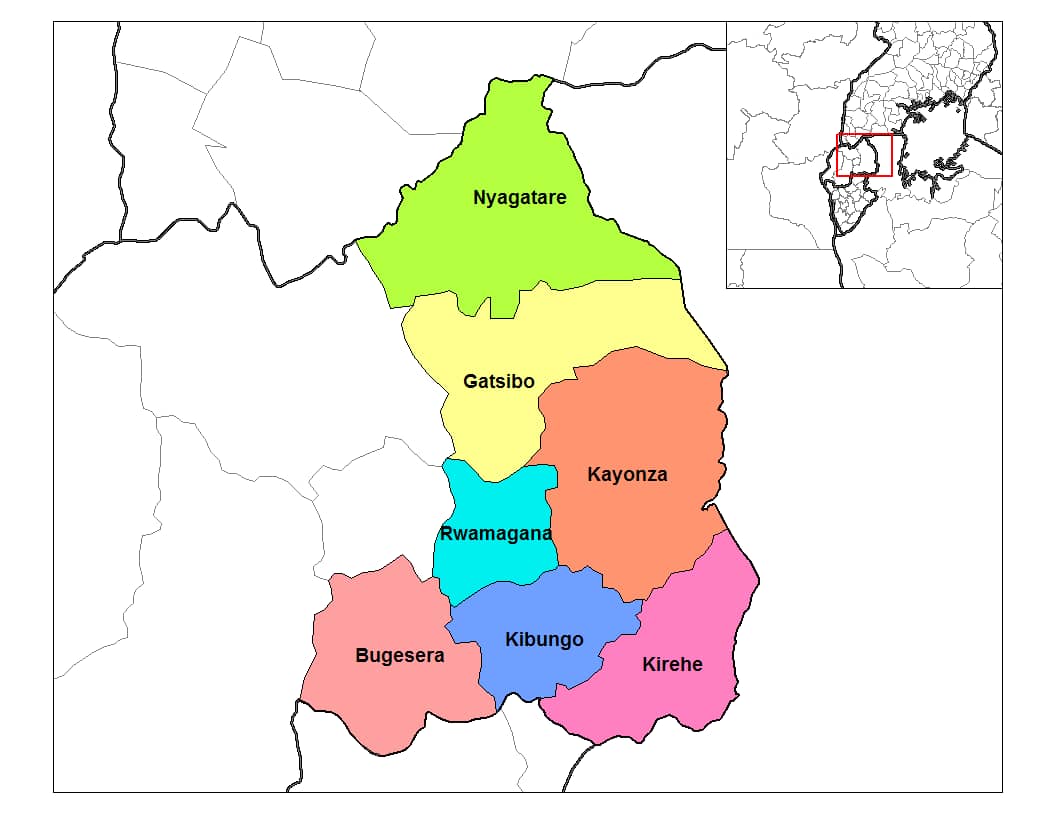
Christine Nyawera, a farmer from Mwiri Sector in Kayonza District, says excessive sun season is a major issue for farmers in the area. She says: “Crops dry up due to the heat, so we have to look for jobs elsewhere. I don’t know if there are any seed varieties that can withstand this heat. The sun season here is extreme, probably because there are not enough trees. I suggest that more trees should be planted in this area.”
Expert Insights on Climate Change in Rwanda
NIYONSABA Ingabire Pascaline, a university lecturer at Rwanda Polytechnic and an expert on climate change and the environment, acknowledges that climate change is a serious issue for Rwandan agriculture. She explains: “Farmers used to predict when to plant, but now they can no longer match traditional planting seasons with today’s season. Reports show that rainfall patterns have changed; the rainy seasons have shortened, but the intensity of rain has increased. Heavy rains now destroy crops, cause floods, and reduce agricultural productivity.”
She further explains: “Some areas suffer from drought, which severely impacts Rwanda since our agriculture relies on rainfall, with little irrigation. Whether there is heavy rain or intense heat, both have negative consequences.”
On what can be done, Pascaline states: “Stopping climate change is impossible, but we can mitigate its impact and adapt to it. In Rwanda, we should plant drought-resistant crops, identify crops suitable for different regions and soil types, continue planting trees to reduce greenhouse gases, implement terracing to control erosion, and conduct further research. These strategies will help combat climate change.”
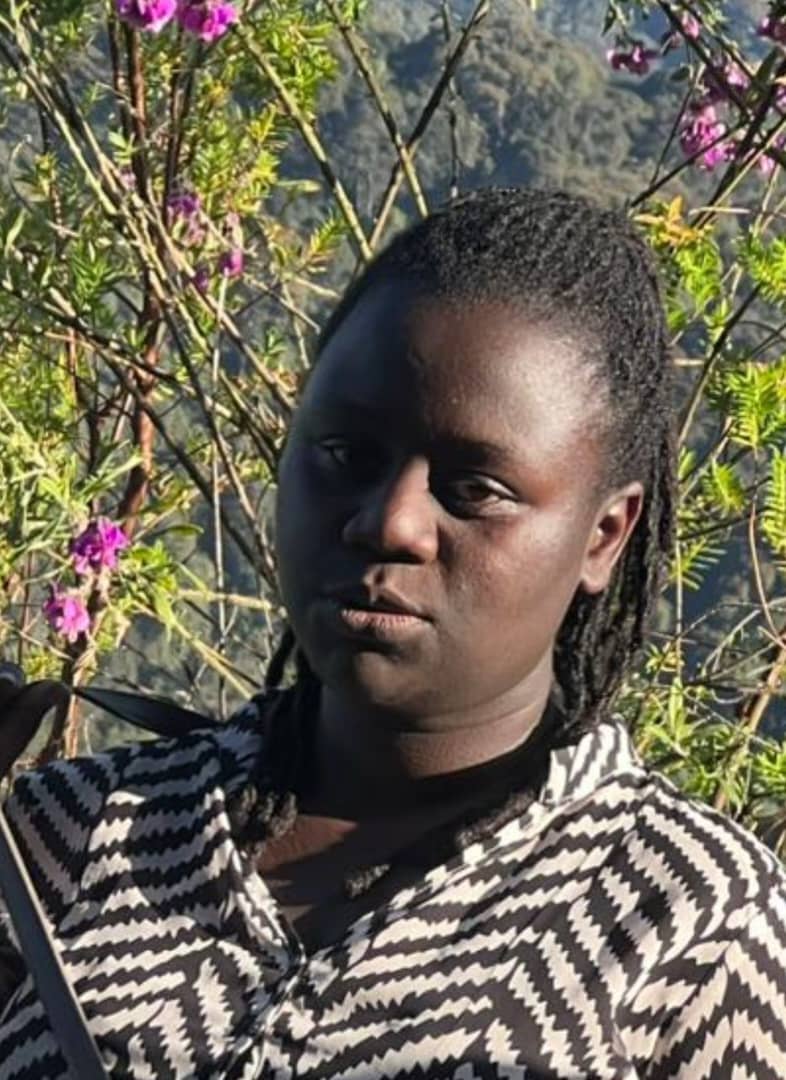
Dr. Ange IMANISHIMWE, the director of the non-governmental organization Biodiversity Conservation Organization (BIOCOOR), which advocates for environmental conservation and addressing the impacts of climate change in Rwanda, acknowledges that climate change is a pressing issue. However, he emphasizes that efforts are being made to help Rwandan farmers cope with the changing climate.
Dr. Ange says: “The issue of climate change is shared by all of us who inhabit this planet. When it deteriorates, its effects impact everyone. Currently, our NGO, BIOCOOR, is working hard to raise awareness among the public about climate change. The way seasons used to follow one another has changed significantly. These shifts have had serious consequences on agriculture, leaving farmers uncertain about weather patterns. They no longer know when to expect prolonged sunshine or rainfall. In the past, they could predict when the rainy or dry season would begin. But now, they expect rain, and experience a prolonged sunshine. This unpredictability has led to a decline in agricultural yields.”
Furthermore, Dr. Ange explains that their organization focuses on educating farmers on how to adapt to climate change. He says: “We assist farmers in learning how to irrigate their crops when rainfall is insufficient. When there is excessive rainfall, we teach them how to prevent soil erosion and other disasters.”
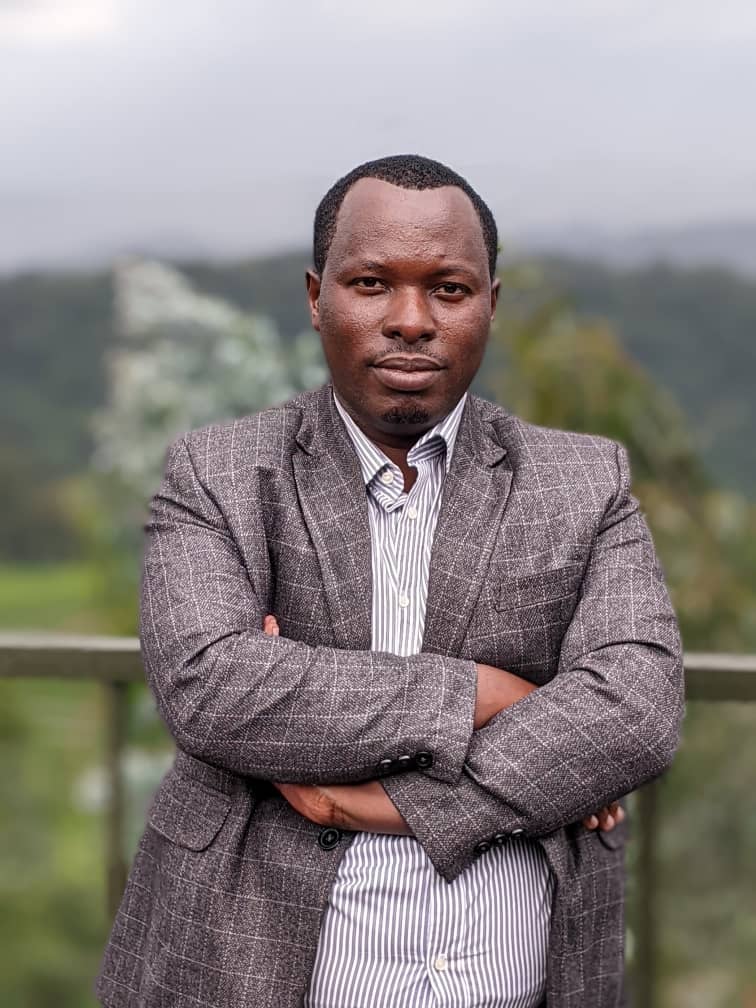
Regarding the role of NGOs in tackling this issue, Dr. Ange emphasizes that they collaborate with the government to disseminate weather forecasts and address climate-related challenges. He notes that climate change is already happening and will not stop; therefore, the focus should be on strengthening resilience. He concludes: “It is the responsibility of everyone to confront climate change. Farmers, in particular, are encouraged to engage in sustainable farming practices and plant more trees to help reduce harmful emissions in the atmosphere.”
Statistical Evidence of Climate Change Impact
According to the Data extracted from the Research conducted by Rwanda Agricultural and Animals resources Development Board; Climate change and its related factors affect Rwandan agriculture by reducing 13.8% of Maize production, 11.3% of Beans production, 12.4% of Rice, 33.5% of Tomato, 24.8% of cassava and 25.2% of Irish potatoes every year. This, gradually affect the living conductions of consumers and Rwandan population in general, where the data of national institute of statistics of Rwanda (NISR) of May 2024 indicate that the prices of agricultural products increased by 4.5% in general, between May 2023 and May 2024, prices increased to 8.4% due to climate change effects.
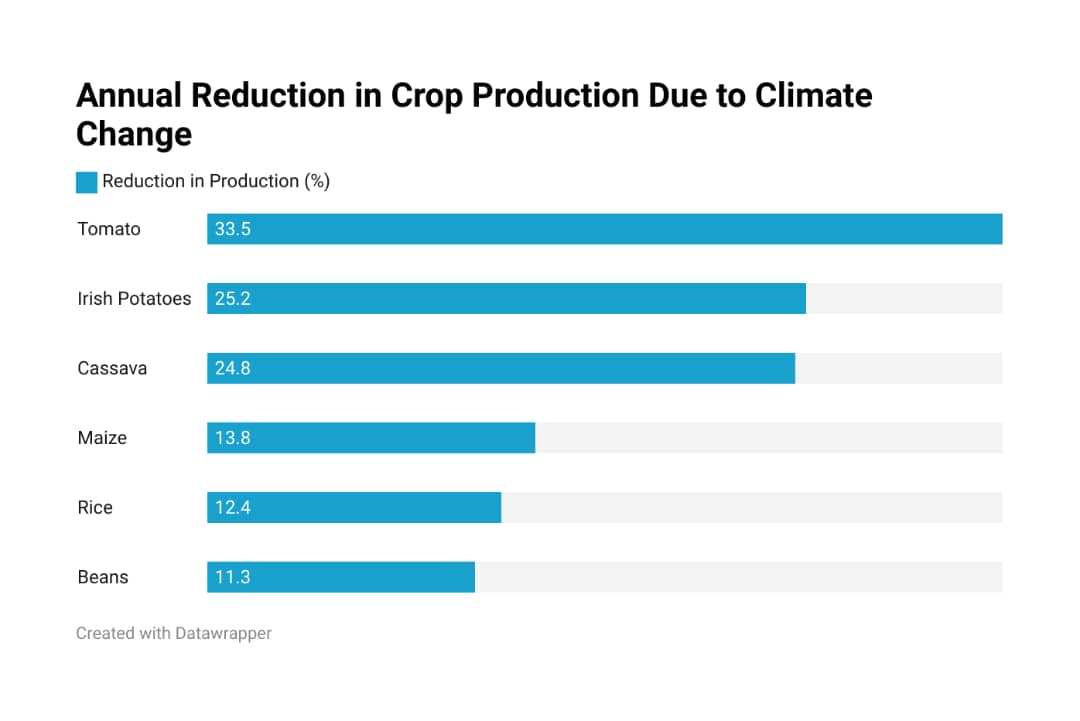
Climate change poses significant challenges to Rwanda’s agriculture, leading to notable reductions in crop yields. Projections indicate that by 2050, under the Representative Concentration Pathway (RCP) 4.5 scenario, potential yields for maize, bush beans, and Irish potatoes could decrease by at least 10%. Under the more severe RCP 8.5 scenario, these reductions may reach 15% or more. These declines are particularly concerning as these crops are central to Rwanda’s Crop Intensification Program.
Additionally, studies like one titled ‘Assessment of Climate Change Impacts on Crop Yields and Farmers’ Adaptation Measures: A Case of Rwanda’ have shown that maximum temperature increases negatively impact yields of beans, maize, and Irish potatoes, while minimum temperature rises adversely affect maize yields. These findings underscore the urgency for adaptive strategies to mitigate climate change’s impact on Rwanda’s agriculture.
Government Efforts to Combat Climate Change
Climate change poses a significant challenge to Rwanda’s agriculture, threatening food security and economic stability. Immediate action is necessary to enhance climate resilience through sustainable farming practices. The Government of Rwanda is implementing various initiatives to mitigate these challenges and support farmers.
The Rwanda Agriculture and Animal Resources Development Board (RAB) has started to implement various strategies to combat climate change effects on agriculture, including expanding irrigation schemes and promoting small-scale irrigation technologies to reduce reliance on rain-fed farming. RAB develops and distributes drought-resistant and early-maturing crop varieties, promotes soil conservation through terracing, mulching, and agroforestry. RAB also supports the National Agricultural Insurance Scheme (NAIS) to help farmers recover from climate-related losses and encourages sustainable farming practices such as crop rotation and conservation agriculture. Additionally, RAB is involved in reforestation efforts, partners with research institutions to develop climate-smart technologies, and promotes the use of digital tools for precision farming. These initiatives aim to enhance farmers’ resilience, improve productivity, and ensure food security despite changing weather patterns.
Dr. Florence UWAMAHORO, the Deputy Director General in charge of Agriculture Development, RAB says:’’ It’s good to know the status of climate change. We have been put in place different measures like Insurance called:’’ TEKANA MUHINZI MWOROZI URISHINGIWE. ‘’ and we encourage them to enter in this program.’’
The Ministry of Agriculture and Animal Resources (MINAGRI) put in place various initiatives to combat the effects of climate change on agriculture and livestock. These include promoting climate-resilient crops, sustainable land management, and agroforestry to prevent soil erosion and improve soil fertility. The ministry has also expanded irrigation infrastructure, introduced drought-resistant seeds, and supported smart agricultural practices such as conservation agriculture and water harvesting. Additionally, MINAGRI has strengthened early warning systems for climate-related risks and encouraged the use of climate-smart technologies, including weather-indexed insurance for farmers. Through these efforts, Rwanda aims to enhance food security and sustain agricultural productivity despite changing climate conditions.
Global Perspective
The Food and Agriculture Organization of the United Nations (FAO) reports that climate change has already negatively impacted global agriculture, with notable regional variations. For example, between 1981 and 2008, global warming led to an approximate 5.5% decrease in average global wheat yields, especially in tropical regions. Projections indicate that, without effective adaptation measures, climate change could place an additional 8 to 80 million people at risk of hunger by 2050.
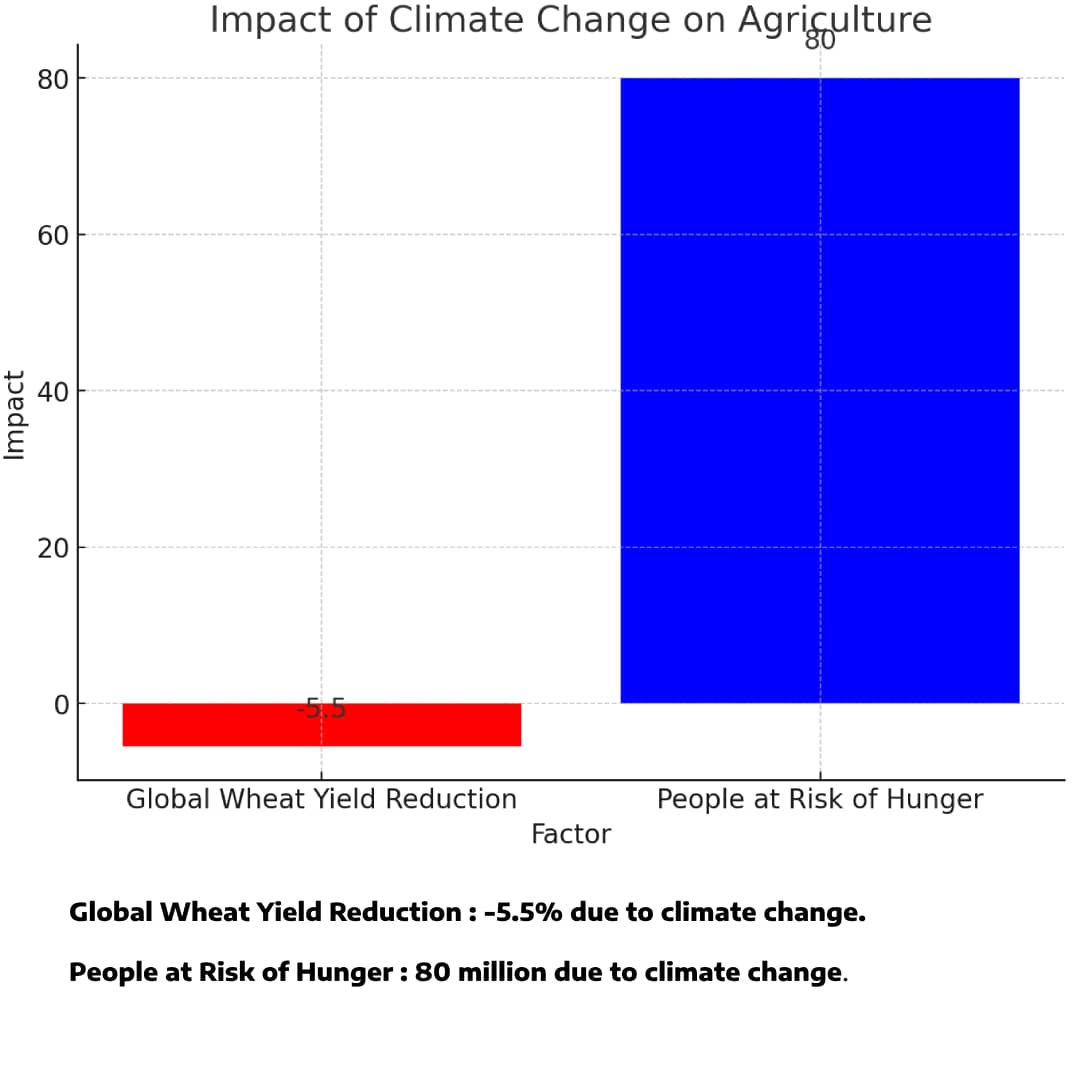
Globally, climate change has significantly affected agriculture, leading to an estimated annual loss of $5 billion in crop production due to extreme weather events, such as droughts, floods, and heatwaves. In Rwanda, According to Climate Change Portal, the agricultural sector, which employs about 70% of the population, faces increasing challenges due to changing rainfall patterns and unpredictable weather, resulting in crop yield losses of up to 20% annually. Climate change threatens global agriculture, with projections showing a 3-12% decline in yields by 2050 and 11-25% by 2100, increasing food insecurity.
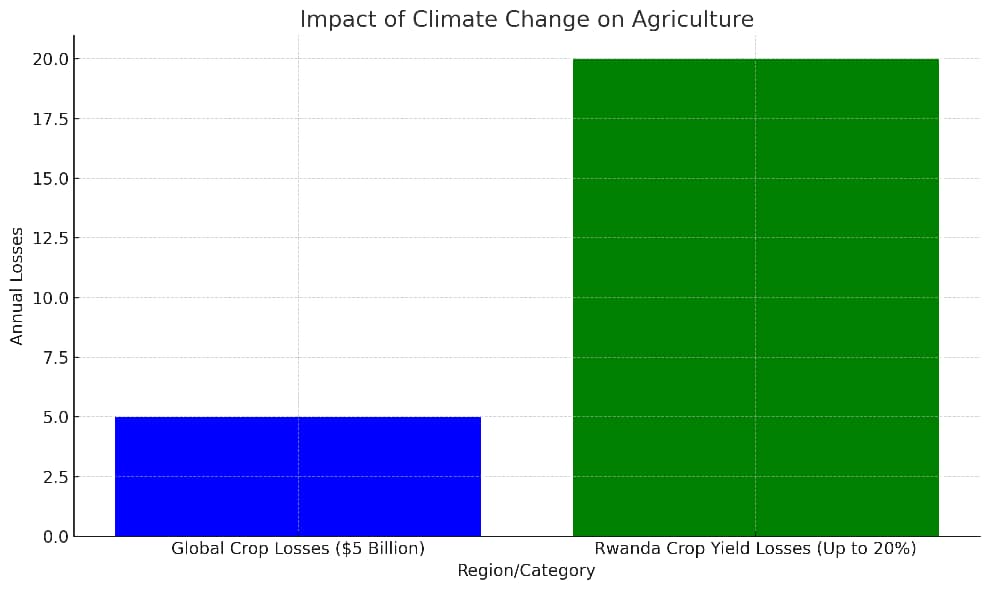
By Marie Louise Mukanyandwi






